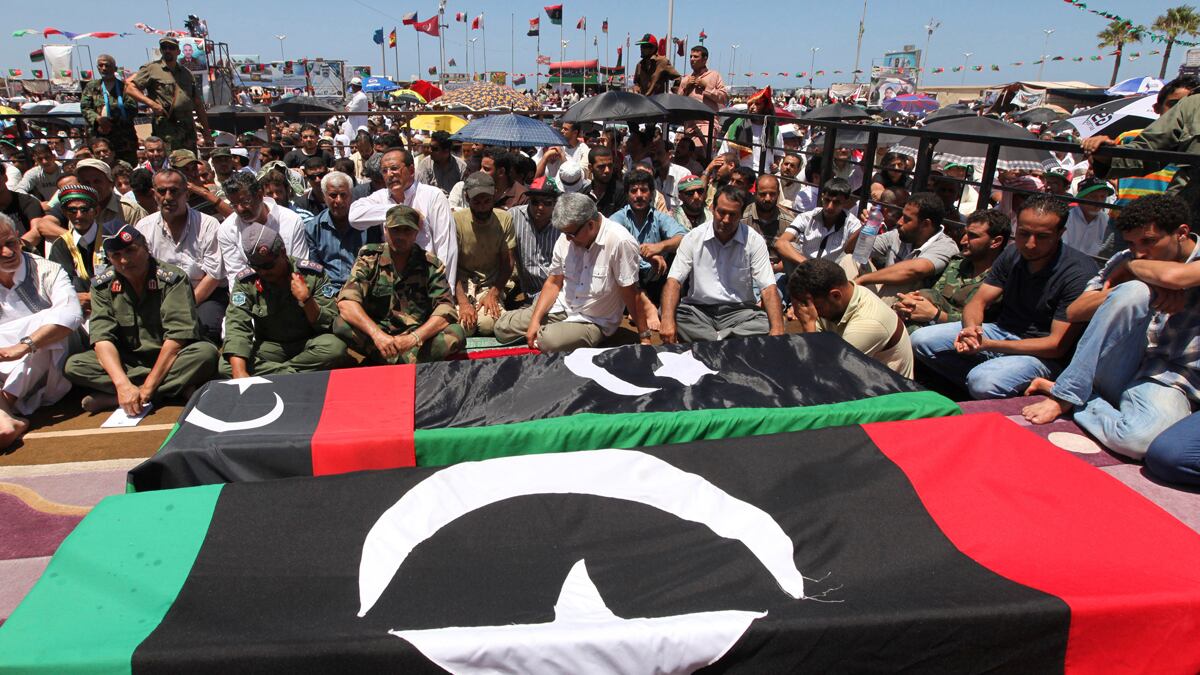Last week’s assassination in Benghazi of Gen. Abdel Fattah Younes, the chief of staff of Libya’s rebel forces, is a major blow and was felt as one by the rebel coalition, which has lost in him an officer they knew well, who was received by Nicolas Sarkozy in Paris, with me, in April. But this is far from the military and political catastrophe it is being made out to be by those in Europe and in the United States who pass up no occasion to discredit the insurgents—the great argument, this time around, being that the muddled circumstances surrounding his assassination, and the uncertainty concerning the identity of those who committed it, is final proof of the structural weakness of the National Transitional Council, and even of the growing power of dissension within its ranks. I firmly reject all of this.
Every resistance, and every armed rebellion, has had to deal with tragedies of this kind, which are the product of machinations more or less resulting from enemy intrigue. The French Resistance, for example, suffered the elimination of many major leaders who were betrayed, starting with Jean Moulin. Ahmed Shah Massoud, the leader of the Afghan Northern Alliance, was killed by a camera bomb after he was sold out, on the very territory of the Alliance, by a man who was supposedly a pillar of the region. The same thing happened with the Algerian FLN, whose ranks were decimated by agents who infiltrated the organization and by resistance fighters the French services turned against it. Revolutions are always at the mercy of a sleeper commando, a “fifth column,” or a manipulated gang. And their politico-military staffs—as anyone who hasn’t lost all historical memory knows—have always been the particular target of double-crossers and of killers who emerge from the shadows. I daresay that the tragedy of the death of Younes is, unfortunately, nothing unusual. And it takes all the bad faith of professional pacifists to perceive in this act proof of a reigning disorder in Cyrenaïca that we had failed to adequately judge before deciding to intervene.

Certainly, it’s a tough blow for Benghazi. All the more so because in General Younes the NTC is losing the commander who, having been Muammar Gaddafi’s right-hand man, was best acquainted with his psychology, the secrets and inner workings of his power, the bunkers they had built together, and his tactics and strategies. (That explains Tripoli’s fixation on eliminating him, putting a price on his head, and making his death an objective of priority.) But if this is a hard blow for the anti-Gaddafis, it is by no means fatal. Though Younes knew the enemy system inside and out, and though, moreover, he enjoyed the allies’ confidence—and, in particular, France’s—he was not the only key player. And in Benghazi, as well as in Misrata and in the Jebel Nafusa, there are career officers and civilian commanders as courageous as Younes and equally adept at leading a free Libya to victory, men who have been virtually alone in winning their own liberation due to their geographical distance from the rebel capital. Finally, his disappearance did not result in any retreat on any of the three fronts of the resistance (Brega, Gualish, and the Misrata area)—in fact, quite the contrary.
A commission of inquiry, expedited by the NTC, has been committed to casting light on the circumstances surrounding Younes’ murder. But one thing is certain: the absurdity of the way in which, over the past few days, this event has become a pretext for claiming that the NTC is an opaque and heteroclite coalition, consisting of elements that are virtually at war with one another. This demonstrates, once again, in Europe as in America, a disturbing absence of historical memory. I know better than anyone that members of the NTC include traditionalists and moderns, tribal representatives, members of the urban middle class, ex-Gaddafists, the occasional barely repentant Islamists and their historical opponents, who are longtime human-rights activists. But to deduce from this a fragility, if not illegitimacy, in the NTC makes no sense. It is tantamount to forgetting, first of all, that the democratic element here represents the overwhelming majority, one that is gaining ground with every passing day. And it forgets, once again, the general history of resistances that have always been, almost by definition, coalitions of this kind—an amalgam of improbable unity composed of all the elements of a nation. Isn’t it true that when one denies this obvious fact, and when one wishes to eliminate divergence and discordant voices, as was the case in Algeria with the FLN, that, ultimately, things always turn out badly? Should we retrospectively reproach the French insurgent movement established in London in 1940 for having taken in men and women from both the left and the right, republicans in mourning for their values and members of Action Française who held the republic responsible for defeat, Freemasons, nationalists, communists and socialists, Gaullists and even anti-Gaullists?
The rumors will have no effect. In the wake of the assassination of one of its own, the Libyan rebellion is, more than ever and perhaps for this very reason, compelled to tighten its bonds and to win. And the coalition, for its part, has no reason to waver, to doubt, or to even think of putting one of the most bloodthirsty tyrants in the Arab world back in the saddle. At the moment when another dictator, in Syria, is drowning his people in the “rivers of blood” Gaddafi had promised his own, it is more imperative than ever to establish what I hope will soon be known as the “Libyan precedent”—by seeing this operation through to its conclusion.




